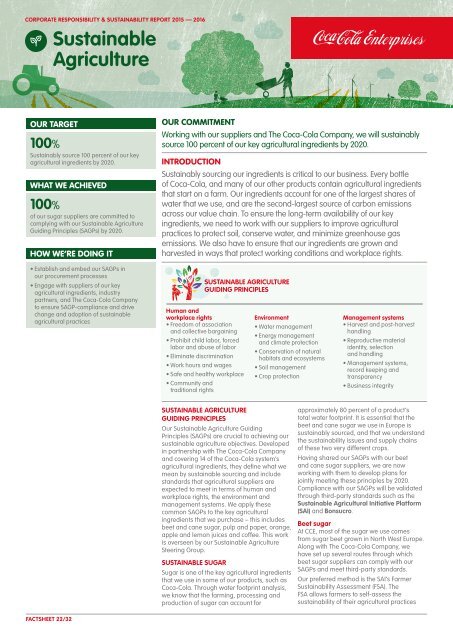Corporate Responsibility & Sustainability Report 2015/2016
1XlqBpD
1XlqBpD
Create successful ePaper yourself
Turn your PDF publications into a flip-book with our unique Google optimized e-Paper software.
CORPORATE RESPONSIBILITY & SUSTAINABILITY REPORT <strong>2015</strong> — <strong>2016</strong><br />
Sustainable<br />
Agriculture<br />
OUR TARGET<br />
100%<br />
Sustainably source 100 percent of our key<br />
agricultural ingredients by 2020.<br />
WHAT WE ACHIEVED<br />
100%<br />
of our sugar suppliers are committed to<br />
complying with our Sustainable Agriculture<br />
Guiding Principles (SAGPs) by 2020.<br />
HOW WE’RE DOING IT<br />
OUR COMMITMENT<br />
Working with our suppliers and The Coca-Cola Company, we will sustainably<br />
source 100 percent of our key agricultural ingredients by 2020.<br />
INTRODUCTION<br />
Sustainably sourcing our ingredients is critical to our business. Every bottle<br />
of Coca-Cola, and many of our other products contain agricultural ingredients<br />
that start on a farm. Our ingredients account for one of the largest shares of<br />
water that we use, and are the second-largest source of carbon emissions<br />
across our value chain. To ensure the long-term availability of our key<br />
ingredients, we need to work with our suppliers to improve agricultural<br />
practices to protect soil, conserve water, and minimize greenhouse gas<br />
emissions. We also have to ensure that our ingredients are grown and<br />
harvested in ways that protect working conditions and workplace rights.<br />
• Establish and embed our SAGPs in<br />
our procurement processes<br />
• Engage with suppliers of our key<br />
agricultural ingredients, industry<br />
partners, and The Coca-Cola Company<br />
to ensure SAGP-compliance and drive<br />
change and adoption of sustainable<br />
agricultural practices<br />
SUSTAINABLE AGRICULTURE<br />
GUIDING PRINCIPLES<br />
Human and<br />
workplace rights<br />
• Freedom of association<br />
and collective bargaining<br />
• Prohibit child labor, forced<br />
labor and abuse of labor<br />
• Eliminate discrimination<br />
• Work hours and wages<br />
• Safe and healthy workplace<br />
• Community and<br />
traditional rights<br />
Environment<br />
• Water management<br />
• Energy management<br />
and climate protection<br />
• Conservation of natural<br />
habitats and ecosystems<br />
• Soil management<br />
• Crop protection<br />
Management systems<br />
• Harvest and post-harvest<br />
handling<br />
• Reproductive material<br />
identity, selection<br />
and handling<br />
• Management systems,<br />
record keeping and<br />
transparency<br />
• Business integrity<br />
SUSTAINABLE AGRICULTURE<br />
GUIDING PRINCIPLES<br />
Our Sustainable Agriculture Guiding<br />
Principles (SAGPs) are crucial to achieving our<br />
sustainable agriculture objectives. Developed<br />
in partnership with The Coca-Cola Company<br />
and covering 14 of the Coca-Cola system’s<br />
agricultural ingredients, they define what we<br />
mean by sustainable sourcing and include<br />
standards that agricultural suppliers are<br />
expected to meet in terms of human and<br />
workplace rights, the environment and<br />
management systems. We apply these<br />
common SAGPs to the key agricultural<br />
ingredients that we purchase – this includes<br />
beet and cane sugar, pulp and paper, orange,<br />
apple and lemon juices and coffee. This work<br />
is overseen by our Sustainable Agriculture<br />
Steering Group.<br />
SUSTAINABLE SUGAR<br />
Sugar is one of the key agricultural ingredients<br />
that we use in some of our products, such as<br />
Coca-Cola. Through water footprint analysis,<br />
we know that the farming, processing and<br />
production of sugar can account for<br />
approximately 80 percent of a product’s<br />
total water footprint. It is essential that the<br />
beet and cane sugar we use in Europe is<br />
sustainably sourced, and that we understand<br />
the sustainability issues and supply chains<br />
of these two very different crops.<br />
Having shared our SAGPs with our beet<br />
and cane sugar suppliers, we are now<br />
working with them to develop plans for<br />
jointly meeting these principles by 2020.<br />
Compliance with our SAGPs will be validated<br />
through third-party standards such as the<br />
Sustainable Agricultural Initiative Platform<br />
(SAI) and Bonsucro.<br />
Beet sugar<br />
At CCE, most of the sugar we use comes<br />
from sugar beet grown in North West Europe.<br />
Along with The Coca-Cola Company, we<br />
have set up several routes through which<br />
beet sugar suppliers can comply with our<br />
SAGPs and meet third-party standards.<br />
Our preferred method is the SAI’s Farmer<br />
<strong>Sustainability</strong> Assessment (FSA). The<br />
FSA allows farmers to self-assess the<br />
sustainability of their agricultural practices<br />
FACTSHEET 22/32


